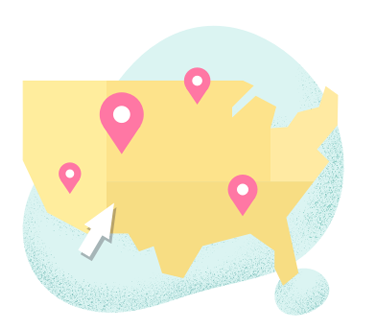

Your company's location affects which policies you need
State laws determine whether your business needs workers' compensation and other policies. Learn the requirements for small businesses in your state and find quotes online for free with TechInsurance.
Which small business insurance policies does your state require?

State laws for workers' compensation insurance
Most states require workers’ compensation insurance as soon as you hire your first employee. Often that's true even for part-time employees, such as a coffee shop that hires a barista for its peak hours.
In some states, professionals in high-risk industries, such as construction, must carry this coverage even if they have no employees. That might include:
The cost of workers' comp can vary depending on your state. Additionally, four states (North Dakota, Ohio, Washington, and Wyoming) require business owners to purchase workers' comp from a state fund.
State laws for commercial auto insurance
Commercial auto insurance is required by almost every state for businesses that own a vehicle. For instance, you'd need this coverage for a truck owned by your flooring installation business, HVAC company, or mobile detailing service.
Personal auto insurance won't cover any business-related driving beyond a commute, which is why anyone who drives for work needs additional coverage. That might include a nurse or caregiver who drives their own car to meet patients, or a computer repair technician who drives their own van to meet clients.
Hired and non-owned auto insurance (HNOA) provides liability protection for personal, rented, and leased vehicles used by your business. You can often add it as an endorsement to your general liability insurance, business owner's policy (BOP), or commercial auto insurance.
Regardless of which policy you buy, make sure your limits meet your state's requirements for auto liability insurance.
State laws for general liability and E&O insurance
In most cases, general liability insurance and errors and omissions insurance (also called E&O, malpractice, or professional liability insurance) are not required by law. However, some professionals do need to buy this coverage.
For instance, you might need a general liability policy to get a license in your trade, or your state might require E&O for your profession in particular.
Here are a few examples:
- General contractors often need to buy general liability insurance in order to get licensed in their state. They might need this coverage to work as an electrician, plumber, or HVAC contractor.
- Real estate agents and brokers might need to show proof of errors and omissions insurance, or have a specific amount of this coverage, to comply with state laws.
- Attorneys must carry malpractice insurance in several states, while others require them to disclose whether or not they carry this type of insurance.
Other insurance factors influenced by your location
Beyond state laws and licensing requirements, your location can affect your business insurance in other ways as well. Specifically, you might see lower or higher insurance rates depending on where your business is located.
Property value in your state determines business owner's policy costs
In states with high property values, you may need higher limits on commercial property insurance or a business owner’s policy to cover potential damage. In areas where earthquakes, floods, or fires are likely, businesses may have difficulty getting insured or pay more for coverage.
Your business location affects insurance costs for several policies
A business centered in an area with higher crime rates or more foot traffic can expect to pay more for business insurance.
Here are a few examples:
- A computer repair store in an area with high crime might pay more for policies that protect against theft and vandalism, such as commercial property insurance or a BOP.
- A cleaning business that parks its vans in a high crime area while serving homes and businesses might pay more for commercial auto insurance.
- A retailer in a busy shopping center can expect to pay a higher rate for general liability insurance, as customer accidents are more likely.
Basically, whenever the chance of a lawsuit or accident goes up, expect to see your insurance premium increase as well. In contrast, companies based in a less-populated or lower crime area may pay less for these policies.